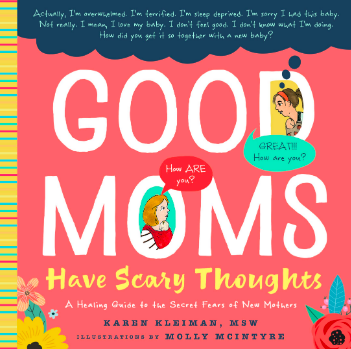 Intrusive thoughts, or ‘scary thoughts’ such as harm coming to the baby can be terrifying and confusing to a new mother suddenly experiencing this lesser-known maternal mental illness symptom during the postpartum period. It’s also one of the reasons why one in five women refuse to seek help fearing that telling their health care provider might result in their baby being taken away by child services.
Intrusive thoughts, or ‘scary thoughts’ such as harm coming to the baby can be terrifying and confusing to a new mother suddenly experiencing this lesser-known maternal mental illness symptom during the postpartum period. It’s also one of the reasons why one in five women refuse to seek help fearing that telling their health care provider might result in their baby being taken away by child services.
“Despite recent attention to postpartum depression and anxiety, women continue to be silenced by the taboo against expressing negative feelings and thoughts about being a mother,” Karen Kleiman told us. Kleiman is a postpartum expert and author of the new book, Good Moms Have Scary Thoughts: A Healing Guide to the Secret Fears of New Moms. “We have discovered, however, that when women find a safe place/person to disclose their unwanted and often intrusive thoughts, this decreases their anxiety, thus, helping them feel better.”

Some examples of intrusive postpartum thoughts include: ‘What if I drop him? What if I snap and hurt my baby? Mothering is so hard—I don't know if I really want to do this anymore.’ In order to help raise awareness and destigmatize the experience of postpartum intrusive thoughts, Kleiman collaborated with illustrator, Molly McIntyre to create her new book which contains exercises and “stigma-busting cartoons” from the viral #speakthesecret social media campaign.
“When our first comic went viral, we knew that we had created characters that were relatable and wanted to reach as many women as we could,” Kleiman told us. “We wanted to provide easy access to essential, restorative information to increase the likelihood that women in distress would find the courage to put words to their feelings and thoughts and reach out for help. Each comic is accompanied by expert guidance as well as journaling exercises for self-help and healing.”
Negative intrusive thoughts are a universal phenomenon, Kleiman explains. Studies show that as many as 91% of all new moms experience unwanted intrusive thoughts of harm coming to their baby. She says they arise in almost every postpartum experience, in both mothers and fathers.
“Understanding that heightened anxiety and hypervigilance, can be an adaptive, evolutionary response to caring for a new infant, it should not surprise us that sometimes, the anxiety can feel out of control,” Kleiman told us. “It is an internal signal that can serve to protect us, and alert us to perceived danger. But during the postpartum period, when women are overwhelmed, emotionally compromised, sleep-deprived, and transitioning to motherhood, the anxiety can combust. Scary thoughts can cause enormous distress to the women who experience them because they feel so out of character and ‘not like who I am.’ Worth noting, the distress is actually what indicates they are anxiety-driven, and not psychotic thoughts, which might be her greatest fear of all. The anxiety-driven scary thoughts, no matter how bad they feel, no matter how much distress they cause, are not associated with actions to harm the baby.”
Too often, healthcare providers overreact or underreact, leaving postpartum women to fend for themselves, Kleiman explains, which can be a daunting and risky task when distress is high. Currently, there is greater attention being placed on improved education and specialized training she says.
“We want this book in the hands of every mom so she can be prepared and feel less isolated if anxiety emerges,” Kleiman told us. “Women who are struggling with symptoms of anxiety and depression will also be comforted by the comics, the expert guidance, and the self-help journaling component. The book tackles the range of perinatal emotions from the widespread worries common to all moms, to clinically significant concerns related to suicidal thoughts and trauma. Perhaps most important, the book helps the reader determine when she might need to ask for help. If we reach each mom, we can successfully intervene in the event that she doesn’t like the way she is feeling. We can empower moms to know the difference between ‘normal’ emotions and those that may indicate that more support is needed.”
Patricia Tomasi is a mom, maternal mental health advocate, journalist, and speaker. She writes regularly for the Huffington Post Canada, focusing primarily on maternal mental health after suffering from severe postpartum anxiety twice. You can find her Huffington Post biography here. Patricia is also a Patient Expert Advisor for the North American-based, Maternal Mental Health Research Collective and is the founder of the online peer support group - Facebook Postpartum Depression & Anxiety Support Group - with over 1500 members worldwide. Blog: www.patriciatomasiblog.wordpress.com
Email: tomasi.patricia@gmail.com